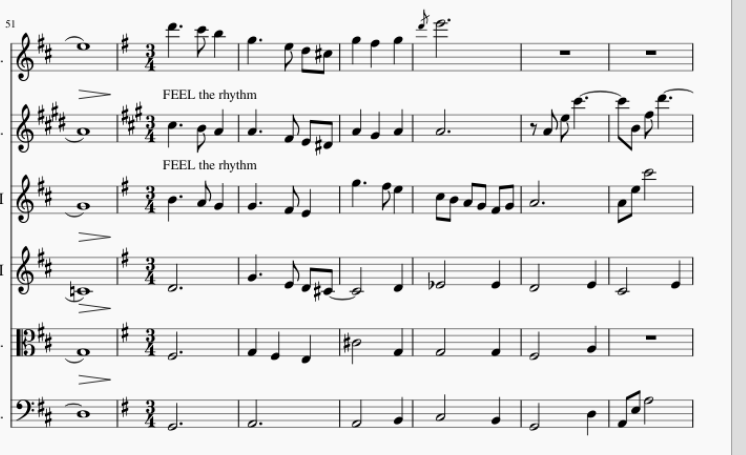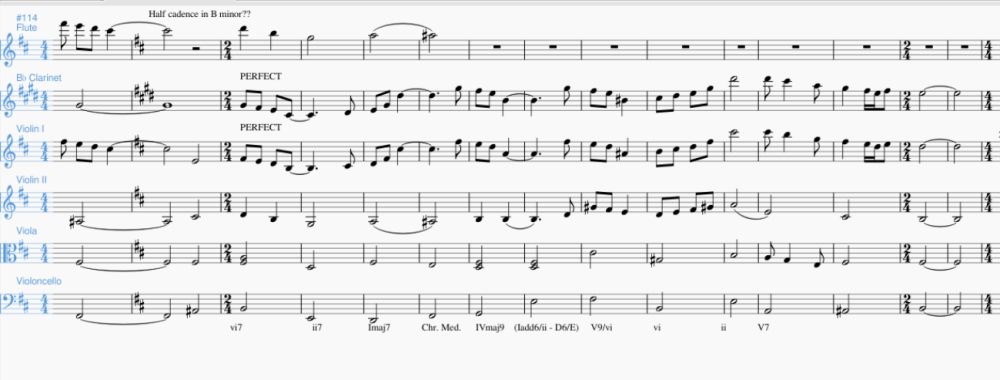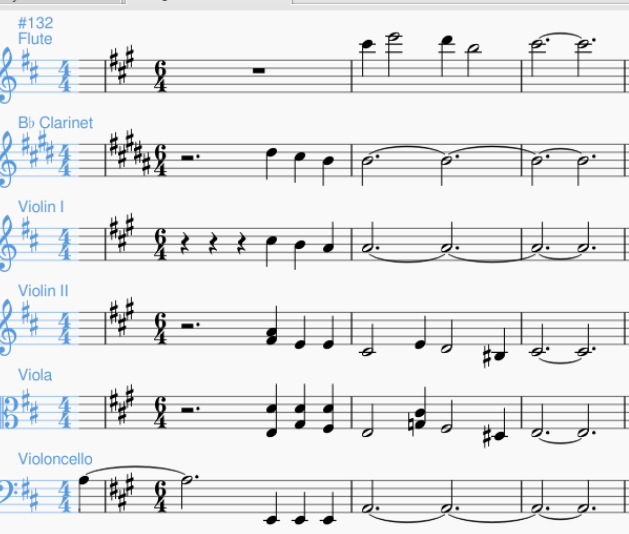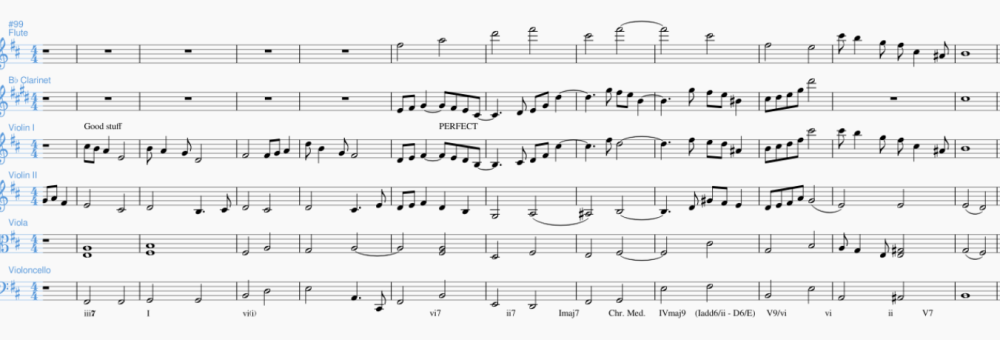-
Posts
206 -
Joined
-
Last visited
-
Days Won
2
GospelPiano12 last won the day on November 2 2024
GospelPiano12 had the most liked content!
About GospelPiano12

- Birthday 10/04/2003
Profile Information
-
Gender
Male
-
Location
Florida
-
Occupation
Student
-
Interests
Composition, music in general
-
Favorite Composers
L.M Gottschalk, Ricardo Castro, Debussy
-
My Compositional Styles
Neo-Romanticism
-
Notation Software/Sequencers
Finale, Musescore, and Noteflight
-
Instruments Played
Alto Saxophone, Organ, Piano, Bass Clarinet
Recent Profile Visitors
1,616 profile views
GospelPiano12's Achievements
-
GospelPiano12 started following String Quartet + Woodwind Piece , Adagio Lamentoso in G Minor for Piano , Chamber Concerto and 4 others
-
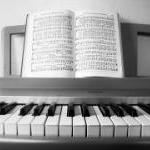
Adagio Lamentoso in G Minor for Piano
GospelPiano12 replied to JorgeDavid's topic in Piano Music, Solo Keyboard
What a lovely piece! You nailed it with the title - although there were some slightly brighter moments, the piece has an overall lamenting tone. I've heard a LOT of compositions where just because the piece was in minor, the composer expected a "sorrowful" or "somber" tone, yes the overall sonority of minor keys tends to be more somber, I believe, if arranged correctly, even major keys can have a melancholic tone to them - BUT, that's a discussion for another day. One thing I enjoyed about this piece is that it sounds more modern without sounding too modern. I'm not sure if that makes any sense lol. Your phrasing is another one of the things you've done so well with this piece. I don't always hear NT and PT and stepwise, scalar motion being used in such a sophisticated way. I like the leaps, they added brightness, while maintaining the shape of the melody. Your harmony is simple, but I'm a sucker for i-iv-V7-i in minor 😂. Overall this piece is very strong - I don't have much more to add that hasn't already been said. I know you have more material in you, I can hear it 👀 As a pianist-composer myself I understand the struggle to balance composition with practice and such - BUT, I would love to hear this piece orchestrated. Nothing too elaborate - maybe a wind quintet with a flute on the melody, just a thought - a bass clarinet on the "tenor" and bass voices 😮💨👌🏾 -
I completely agree - horns are definitely the way to go
-
-
Most of my work is Romantic, with somewhat of a contemporary feel (in my opinion) I have three notes written so far lol — F, Db, and Ab. I think the melody will flow with scalar-esque motion and leaps (up and down). I love maj7 leaps on strings and higher-register woodwinds. In a concerto, are you "allowed" to have an introduction from the ensemble before bringing in the soloist?
-
Hey guys! I'm getting ready to start on my longest piece to date: a 10-minute chamber concerto featuring the oboe as the soloist. Instrumentation (subject to change): Woodwinds - Oboe, Flute, Bb Clarinet, Basson, Bass Clarinet Strings - 4 Violins, 2 Violas, 2 cellos, 2 DB Brass: French Horn, 2 Trumpets I am not sure where to start, so I was hoping to see if anyone had any resources they could recommend, such as words of advice, structural advice, instrumentation, etc. Thank you
-

Arpeggio Etude for Piano
GospelPiano12 replied to PeterthePapercomPoser's topic in Piano Music, Solo Keyboard
I really enjoyed the energy of the piece and the almost "pulsating" feeling it has in some spots, there is a nice use of a large range on the piano. -

What makes a chord follow poorly or well from another?
GospelPiano12 replied to Polaris's topic in Composers' Headquarters
I actually really like the way you put this - I completely agree with this. We who have studied theory would be more aware of the inner voices and contrapuntal lines, but to the untrained ear, what sounds good, sounds good. It could be the worst counterpoint you've ever heard, but if it has a "nice" sound, that's enough for them. -
Me too! Thanks for your encouragement! Exactly. I had to move on to bigger and better things. I'm already brainstorming some ideas for my next piece. I would love to keep exploring "lush" harmony and chamber ensembles. I was pleasantly surprised by how much I enjoyed writing for this ensemble. Umm b/c it's the BEST lol. I was originally going to start with just the tonic maj7 chord, but I felt like the dominant-suspended harmony just set the tone better for the rest of the piece. I'm open to receiving any feedback that anyone has - I want to keep improving my orchestration, harmony writing, form, etc. basically everything
-

Can somebody give me feedback on this mixed trio?
GospelPiano12 replied to Neo36563's topic in Chamber Music
The sound is very hollow throughout the majority of the piece. Your rhythm is interesting, but in some spots, it feels very random, especially when all 3 instruments are playing different rhythms at the same time—it just sounds jumbled. This may not be the sound you're going for, but try your flute harmonizing in 3rds or 6ths above the trumpet, I do that a lot b/c it keeps a solid interval in the harmony, while also accompanying what's already written for the main instrument. -

What makes a chord follow poorly or well from another?
GospelPiano12 replied to Polaris's topic in Composers' Headquarters
I like this thought process - I tend to write horizontally and vertically, but a solid line is a solid line lol But that makes sense though, if each "harmonizing" voice is just a solid line that works well against the other voices, then really there's no need to think about chord structure. The harmony will just come from the counterpoint (or the contrapuntal style writing) -
Thank you to everyone who gave me feedback - this is the final piece! Program Notes: "Beauty for Ashes" draws inspiration from Isaiah 61:3: "To appoint unto them that mourn in Zion, to give unto them beauty for ashes, the oil of joy for mourning, the garment of praise for the spirit of heaviness; that they might be called trees of righteousness, the planting of the Lord, that He might be glorified." This piece reflects the contrast between sadness and joy, crafted through Louis's signature blend of traditional and modern harmony; inspired by jazz harmony and film scores. The main motif, a 5-measure phrase, ascends with leaps and scalar motion, symbolizing the climb towards joy and redemption. Secondary material navigates unexpected harmonic terrain, briefly shifting to evoke turmoil before returning to the main theme, restored and renewed. Louis uses modern harmony, secondary dominants, and modal mixture, creating a nuanced emotional landscape in which sorrow's depth and hope's radiance intertwine. The piece culminates in a triumphant, cinematic chorale finale, symbolizing hope and victory. Sweeping dynamics converge with moving harmony lines, resolving to a radiant major 7th chord, evoking flourishing "trees of righteousness" – roots deepened by sorrow, branches stretching toward light. Duration: 5:22 Instrumentation: 1 Flute, 1 Bb Clarinet, 2 Violins,1 Viola, 1 Cello
-

What makes a chord follow poorly or well from another?
GospelPiano12 replied to Polaris's topic in Composers' Headquarters
This seems like the perfect forum to ask this question...what chord fits best in mm.55? There's a great opportunity for an emerging, bright sound, but idk what chord works the best. -
Oh yeah, I didn't even realize that - my bad I wanted a chorale-sounding finish and I think this really works I also LOVE this part - I have that melody + chord progression in there 2x with alterations
-
I 100% agree...when I first started writing this piece I wasn't quite sure which direction the structure would go and I was just writing things to fill up space and hopefully get things going. I was aiming for about 4.5- 5 minutes. I think if I take out those sections and work on connecting what I have, I'll be solid. If I may ask, what about the ending sounds unfinished? If you guys couldn't already tell, I'm a big fan of hymns, and stuff like that allows me to throw in little hints of things I like into the piece lol How do I keep it from being so simple?
-
This is my rough final draft of a piece I've been working on for a string quartet with clarinet and violin. My main thing right now is getting everything connected and refining my harmony. I wrote some sections that are just there and have no relation to the piece. I am also trying to follow my modern-classical-lush sound in the harmony, but I haven't perfected it. If you could please look it over, maybe mark it up, give some harmony/chord progression suggestions, and anything else, I would greatly appreciate it. Some "rules" I've learned for getting that sound - every chord gets a 7th (at least) - trying to always use the full chord - Use functional tonal harmony, and color special moments with chromaticism (iii7 a lot, modeal mixture, and secondary dominants)




.thumb.png.8b5b433a341551e913a34392660bc95b.png)









